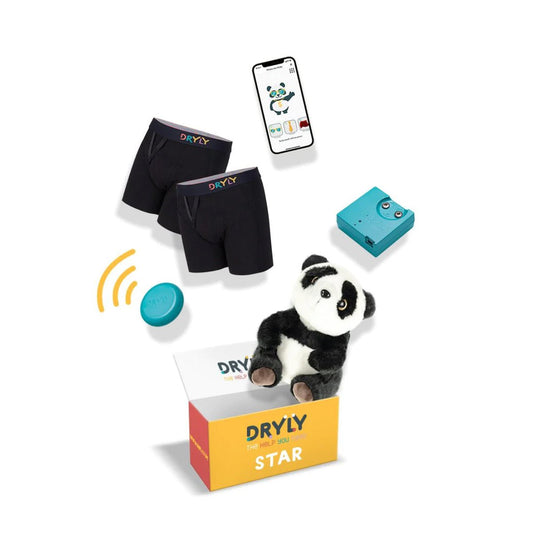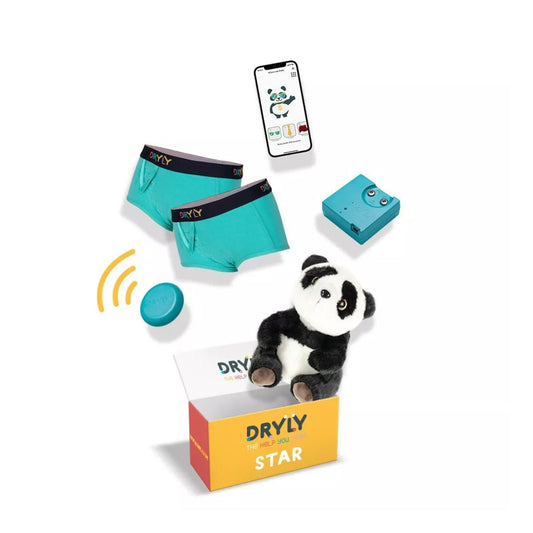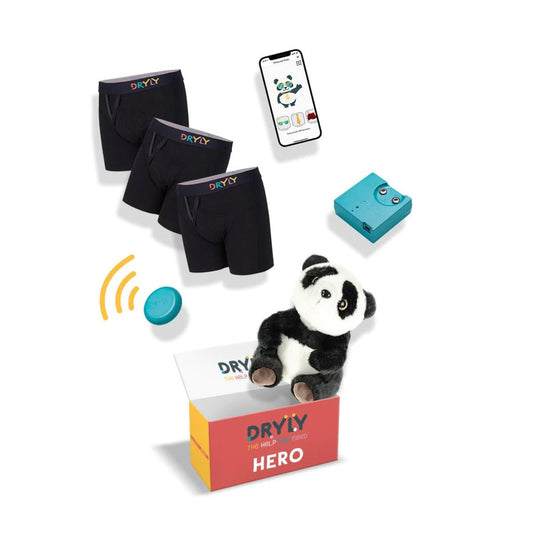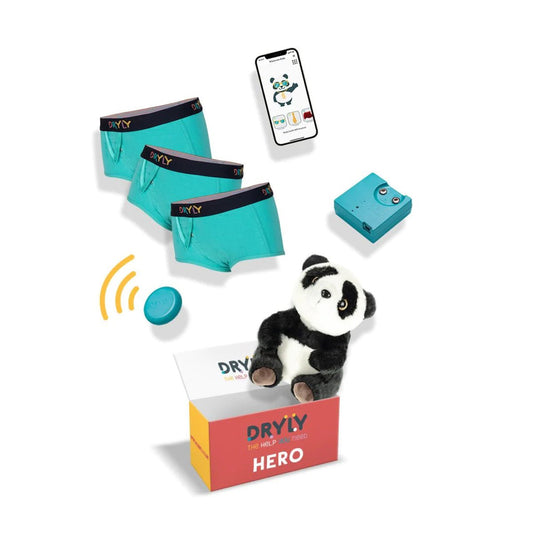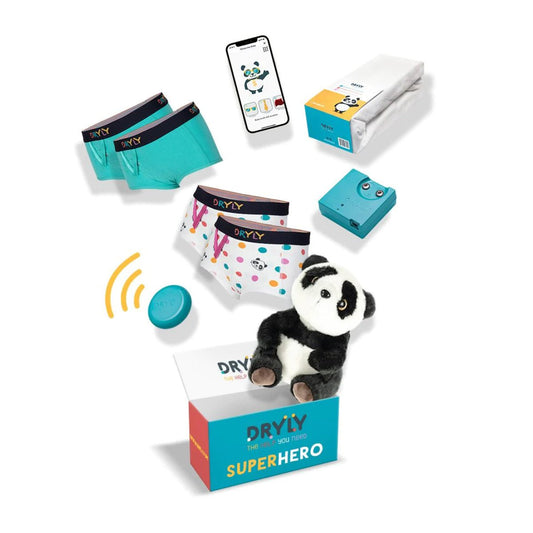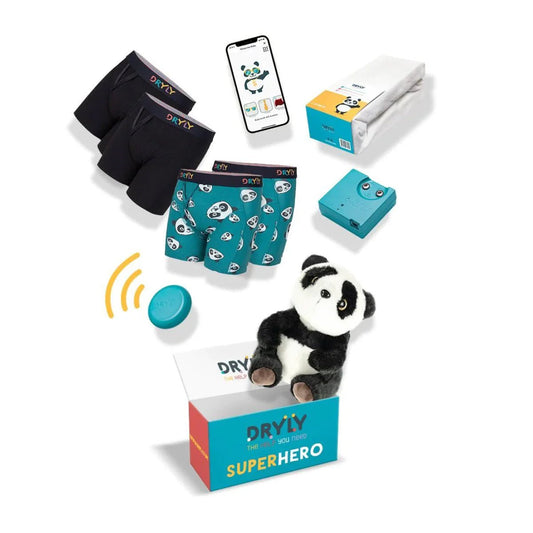Medication for bedwetting child
Many parents are unsure what the options are when their child wets the bed. Should you immediately start bedwetting medication for your child, or is a bedwetting alarm a better first step? Bedwetting is not only annoying for the child, but it can also cause insecurity and a negative self-image. Fortunately, there are several solutions available to help your child! Read more about the bedwetting alarm, behavior modification and bedwetting medication.
When is bedwetting a problem?
In young children, bedwetting is still very common. From the age of 5 years old, you could say that action may be required to do something about it. If your child still wets the bed, it may be wise to look into possible solutions. Often the bedwetting alarm is initially recommended. If at a slightly later age such as 7 years old this does not have a desired effect, a doctor may decide to prescribe bedwetting medication for your child.
Bedwetting medication or bedwetting alarm?
The bedwetting alarm is often the first choice and most recommended method in dealing with bedwetting. This method teaches the child to wake up to urges from the bladder. If the bedwetting alarm does not produce results after several months (be sure to give this enough time, an average bedwetting alarm training takes 4 months) then the doctor may consider medication for bedwetting. Medication can be especially helpful during situations such as sleepovers, vacation or school camp, where bedwetting can be extra stressful for a child. This temporarily stops bedwetting.

Minrin, most frequently prescribed bedwetting medication
The most commonly prescribed bedwetting medication for your child is Minrin. This drug is a synthetic form of the body's own hormone ADH. Normally, this hormone causes less urine to be produced at night. In some children, this does not yet work optimally, which can lead to a full bladder and bedwetting.
Minrin reduces urine production during the night. As a result, the bladder is more likely to be able to hold urine throughout the night. This medication is available in tablet form and as a melting tablet (Minrin Melt).
Minrin Melt
Minrin Melt in the newest version of Minrin, it is designed specifically for children. The tablet melts under the tongue and thus does not need to be taken with water. This makes taking this bedwetting medication much easier for the child, especially for children who have difficulty swallowing. The use of Minrin Melt is ideal for occasional situations, but can also be prescribed for longer periods of time as part of the treatment.
Bedwetting medication for an overactive bladder
There are also children who do not have problems with urine production, but with an overactive bladder. In this case, a doctor may also prescribe Oxybutnine. This bedwetting medication for your child causes the bladder to relax better and contract less quickly. As a result, there is less urge to urinate.
For children with an overactive bladder, bladder training is often started first, practicing holding up urine during the day. Medication such as Oxybutnine can support this process by increasing bladder volume.
Note that a side effect of Oxybutnine is decreased perspiration, which can lead to overheating, especially in high temperatures. If the temperature exceeds 30º Celsius, it is advised to temporarily discontinue this medication or take additional measures.
Furosemide, another option
A more unfamiliar and less used form of bedwetting medication for a child is Furosemide (Also known as Lasix). This medication causes the body to expel more fluids during the day so that less urine is produced at night. This method is used only in specific cases and always under the strict supervision of a doctor.
Medication for bedwetting: always see your doctor first
Although there are various forms of bedwetting medication for the child, it is hugely important not to start this on your own initiative. Always consult the family doctor first. According to official guidelines, behavioral solutions such as the bedwetting alarm are always considered first before moving on to medication.
A good treatment plan can make the difference between permanent bedwetting and a dry night. In most cases, only the bedwetting alarm is needed to potty train your child, therefore medication comes even after a bedwetting alarm seems to have no effect. Always consult your doctor carefully.
Conclusion on bedwetting medication
Bedwetting can cause a lot of stress for children, fortunately there are several effective solutions available. The bedwetting alarm remains the first choice, but if this does not work, bedwetting medication such as Minrin, Minrin Melt, Oxybutnine or Furosemide can offer a solution. Therefore, always get proper advice from a medical professional.
Unlike medication that temporarily suppresses the bedwetting problem, a bedwetting alarm helps to keep changing the underlying behavior. For this very reason, specialists and general practitioners recommend that, whenever possible, a period of time with a bedwetting alarm should always be tried before medication is used.
Frequently asked questions causes of bedwetting
What are the most common causes of bedwetting?
Bedwetting is often caused by a combination of factors such as a small bladder, deep sleep, heredity and sometimes stress.
Consequently, these are the most common causes.
Can bedwetting occur without a clear cause?
Yes, in many children there is no obvious medical cause, it may have to do with bladder and nerve development.
Does heredity always play a role in bedwetting?
Not always, but children with history are more likely to have bedwetting.
-
Dryly® Bedwetting Alarm Star
Normal price 199.99Normal priceUnit Price / per255.95Offer price 199.99- Guidance via mobile app
- Underwear plain 2-pack
- Optional vibration function
- Wizzu (panda cuddly toy)
- Transmitter & receiver
Sale -
Dryly® Bedwetting Alarm Hero
Normal price 229.99Normal priceUnit Price / per278.94Offer price 229.99Most chosen- Guidance via mobile app
- Underwear plain 3-pack
- Optional vibration function
- Wizzu (panda cuddly toy)
- Transmitter & receiver
Sale -
Dryly® Bedwetting Alarm Superhero
Normal price 259.99Normal priceUnit Price / per325.92Offer price 259.99Best deal- Guidance via mobile app
- Extra mattress protector
- Underwear plain 2-pack
- Underwear print 2-pack
- Optional vibration function
- Wizzu (panda cuddly toy)
- Transmitter & receiver
Sale
Frequently asked questions toilet training at night
From what age do you start toilet training at night?
There is no set age at which to begin nighttime potty training. Each child develops at his or her own pace. A good time is when your child is potty trained during the day, and has motivation to work on this himself. This usually begins from the age of 5 years old.
What if my child continues to bedwash at night despite nighttime training?
If bedwetting persists longer, such as after age 6, there may be nocturnal enuresis. This is often not psychological, but physical in nature. A bedwetting alarm is an effective aid. When in doubt, you can always consult a doctor.
Does it help to drink less before sleeping?
Limiting fluid intake before bedtime can sometimes help, but it is important to do so in a healthy way. Give your child plenty to drink during the day, and avoid sugary drinks in the evening. Always make sure your child pees before bedtime!
Is the use of a bedwetting alarm effective?
Yes, pee alarms have been used effectively in nighttime potty training for decades. A bedwetting alarm helps children become aware of the sensation of a full bladder. This helps children gain a lot of confidence and speeds up the process considerably.
